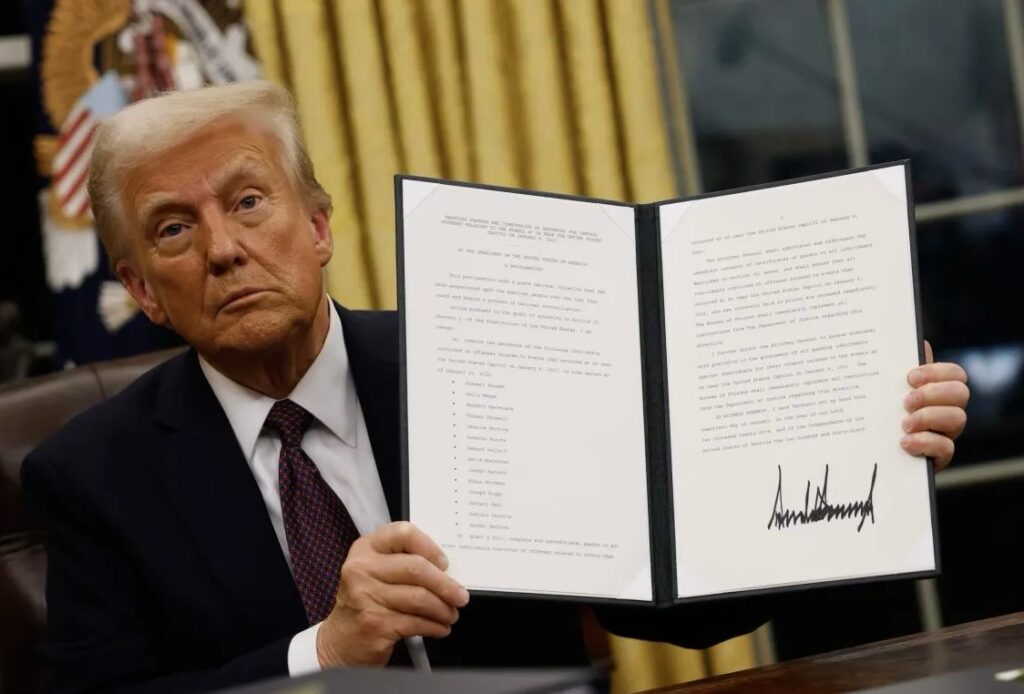By: Raja Zahid Akhtar Khanzada
Texas: A new bill is being introduced in Congress that could initiate impeachment proceedings against federal judges who had suspended some of President Donald Trump’s actions. Several Republican members are supporting this move, potentially escalating tensions between the judiciary and the executive branch. The White House and Trump’s allies see it as a “restoration of governmental authority,” while critics argue it is an attack on judicial independence.
Recently, President Donald Trump expressed strong reservations about federal judges’ rulings during a press conference, stating that perhaps these judges also “need to be looked at” as this represents a “serious violation.” He was accompanied by Elon Musk, head of the Department of Government Efficiency (DOGE), who also voiced frustration over judicial decisions.
Republican leader Andrew Clyde, a House Representative from Georgia, announced that he is preparing to introduce an impeachment resolution against Chief Judge John J. McConnell Jr. of the U.S. District Court. McConnell had ordered the Trump administration to lift restrictions on government spending, which Republican members are calling “political retaliation.” Similarly, Republican Congressman Eli Crane from Arizona has indicated plans to move impeachment proceedings against federal judge Paul Engelmayer, who had blocked DOGE from accessing sensitive records at the U.S. Treasury Department, sparking outrage among Republicans. However, both McConnell and Engelmayer have refrained from commenting on these matters.
Analysts suggest that while impeachment proceedings against these judges could pass the House of Representatives with a majority vote, their approval in the Senate remains unlikely. The current Senate comprises only 53 Republican members, whereas removing a judge requires a two-thirds majority.
Historically, the impeachment of U.S. federal judges has been rare and typically reserved for corruption, perjury, or severe misconduct. The last such instance was in 2010 when a federal judge was removed over financial irregularities. In this context, some experts are labeling this effort as “the politicization of the judiciary.”
Elon Musk has emerged as a key figure in this development, advocating for bureaucratic reforms alongside the Trump administration. Recently, Musk stated on social media that “not just one, but multiple judges need to be impeached immediately.”
The Trump administration has faced numerous judicial obstacles, with some rulings appearing to specifically target its policies. These include a Washington federal judge’s order mandating the restoration of foreign aid funds, a Maryland judge’s decision preventing restrictions on medical care for transgender individuals under 19, and a New York judge’s ruling blocking DOGE officials from accessing Treasury Department records. Additionally, a Boston judge suspended the Trump administration’s directive to revoke birthright citizenship for children of undocumented immigrants.
Tensions between the judiciary and the executive branch were also evident during Trump’s first term, particularly regarding his travel bans on Muslim-majority countries and other policy measures. Statistics indicate that federal courts issued 64 rulings against Trump during his first term, accounting for half of the 127 adverse rulings against presidents since 1963.
Vice President J.D. Vance also criticized these court rulings, asserting that “judges cannot be allowed to control the administration’s legal powers.” White House Press Secretary Caroline Leavitt labeled these judges as “political activists.” Meanwhile, Attorney General Pam Bondi signaled that the Justice Department would fully support Elon Musk and the Trump administration but acknowledged that immediate impeachment proceedings against judges were unlikely.
Republican senators have expressed mixed reactions. Senator Chuck Grassley stated, “Our constitutional system is based on checks and balances, and we should continue to operate under that principle,” whereas Senator John Kennedy remarked, “I don’t agree with every court decision, but I do not intend to attack judicial independence.”
Experts believe this impeachment campaign is unlikely to succeed, but it could still impact the judiciary. Douglas Keith, a senior attorney at the Brennan Center for Justice, warned, “If Congress uses impeachment as a political tool against judges, they may hesitate to rule against government decisions, which would be dangerous for democracy.”
Under the U.S. Constitution, the House of Representatives has the authority to impeach the president, vice president, and other federal officials, including judges. However, impeachment requires a simple majority in the House and a two-thirds majority in the Senate, which poses a significant challenge for Republicans.
In the past 120 years, only 15 federal judges have faced impeachment proceedings, with eight being removed. The first case was in 1803 when Judge John Pickering was removed due to mental instability and intoxication while performing judicial duties. Other impeachments have involved corruption, tax fraud, bribery, and using court rulings for personal gain.
Given the current scenario, questions are being raised about the role and independence of the judiciary, with political analysts predicting that this conflict may intensify in the future.



